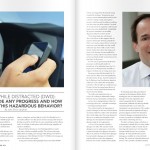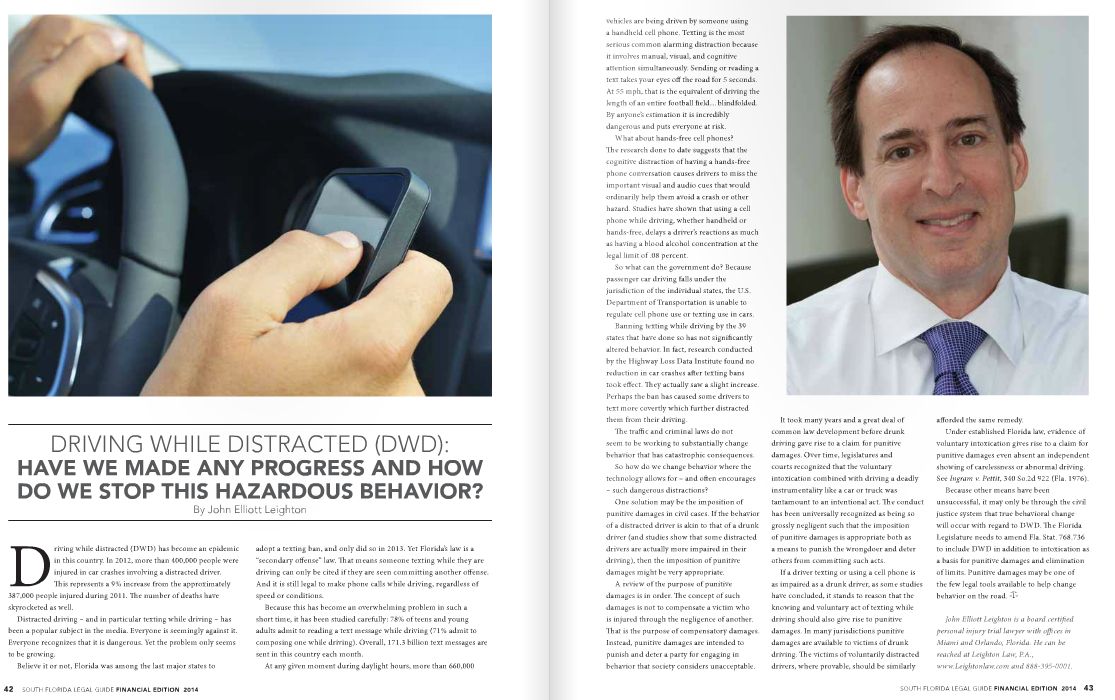Negligent Security Seminar | March 2015
Florida personal injury lawyers
talk to an attorney 888.988.1774
NO FEES or COSTS UNLESS YOU GET PAID
Driving While Distracted (DWD): Are we willing to accept a mounting death toll as a price for convenience?
John Elliott Leighton’s article on “DWD- Driving While Distracted: Have we Made any Progress and How do We Stop this Hazardous Behavior?” is published in the new issue of the South Florida Legal Guide. Mr. Leighton discusses the continuing problem of texting while driving (and other distractions) and suggests a way to help stop this behavior.
DWD: Have we Made any Progress and How do We Stop this Hazardous Behavior?
By John Elliott Leighton
Driving while distracted (DWD) has become an epidemic in this country. In 2012, more than 400,000 people were injured in car crashes involving a distracted driver. This represents a 9% increase from the approximately 387,000 people injured during 2011. The number of deaths have skyrocketed as well.
Distracted driving – and in particular texting while driving – has been a popular subject in the media. Everyone is seemingly against it. Everyone recognizes that it is dangerous. Yet the problem only seems to be growing.
Believe it or not, Florida was among the last major states to adopt a texting ban, and only did so in 2013. Yet Florida’s law is a “secondary offense” law. That means someone texting while they are driving can only be cited if they are seen committing another offense. And it is still legal to make phone calls while driving, regardless of speed or conditions.
Because this has become an overwhelming problem in such a short time, it has been studied carefully: 78% of teens and young adults admit to reading a text message while driving (71% admit to composing one while driving). Overall, 171.3 billion text messages are sent in this country each month.
At any given moment during daylight hours, more than 660,000 vehicles are being driven by someone using a handheld cell phone. Texting is the most serious common alarming distraction because it involves manual, visual, and cognitive attention simultaneously. Sending or reading a text takes your eyes off the road for 5 seconds. At 55 mph, that is the equivalent of driving the length of an entire football field…blindfolded. By anyone’s estimation it is incredibly dangerous and puts everyone at risk.
What about hands-free cell phones? The research done to date suggests that the cognitive distraction of having a hands-free phone conversation causes drivers to miss the important visual and audio cues that would ordinarily help them avoid a crash or other hazard. Studies have shown that using a cell phone while driving, whether handheld or hands-free, delays a driver’s reactions as much as having a blood alcohol concentration at the legal limit of .08 percent.
So what can the government do? Because passenger car driving falls under the jurisdiction of the individual states, the U.S. Department of Transportation is unable to regulate cell phone use or texting use in cars.
Banning texting while driving by the 39 states that have done so has not significantly altered behavior. In fact, research conducted by the Highway Loss Data Institute found no reduction in car crashes after texting bans took effect. They actually saw a slight increase. Perhaps the ban has caused some drivers to text more covertly which further distracted them from their driving.
The traffic and criminal laws do not seem to be working to substantially change behavior that has catastrophic consequences.
So how do we change behavior where the technology allows for – and often encourages – such dangerous distractions?
One solution may be the imposition of punitive damages in civil cases. If the behavior of a distracted driver is akin to that of a drunk driver (and studies show that some distracted drivers are actually more impaired in their driving), then the imposition of punitive damages might be very appropriate.
A review of the purpose of punitive damages is in order. The concept of such damages is not to compensate a victim who is injured through the negligence of another. That is the purpose of compensatory damages. Instead, punitive damages are intended to punish and deter a party for engaging in behavior that society considers unacceptable.
It took many years and a great deal of common law development before drunk driving gave rise to a claim for punitive damages. Over time, legislatures and courts recognized that the voluntary intoxication combined with driving a deadly instrumentality like a car or truck was tantamount to an intentional act. The conduct has been universally recognized as being so grossly negligent such that the imposition of punitive damages is appropriate both as a means to punish the wrongdoer and deter others from committing such acts.
If a driver texting or using a cell phone is as impaired as a drunk driver, as some studies have concluded, it stands to reason that the knowing and voluntary act of texting while driving should also give rise to punitive damages. In many jurisdictions punitive damages are available to victims of drunk driving. The victims of voluntarily distracted drivers, where provable, should be similarly afforded the same remedy.
Under established Florida law, evidence of voluntary intoxication gives rise to a claim for punitive damages even absent an independent showing of carelessness or abnormal driving. See Ingram v. Pettit, 340 So.2d 922 (Fla. 1976).
Because other means have been unsuccessful, it may only be through the civil justice system that true behavioral change will occur with regard to DWD. The Florida Legislature needs to amend Fla. Stat. 768.736 to include DWD in addition to intoxication as a basis for punitive damages and elimination of limits. Punitive damages may be one of the few legal tools available to help change behavior on the road.
John Elliott Leighton is a board certified personal injury trial lawyer with offices in Miami and Orlando, Florida. He can be reached at Leighton Panoff Law, P.A.,
www.Leightonlaw.com and 888-395-0001.










